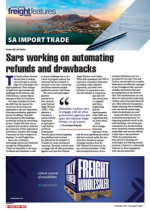South African meat and poultry importers are continuing to face a multitude of challenges, ranging from global inf lation to the sluggish reopening of markets, all of which are impacting the affordability of products, according to Paul Matthew of the Association of Meat Importers and Exporters (A m ie).“South African authorities have also been slow to reopen markets that are deemed free of avian f lu by the World Organisation for Animal Health, an internationally recognised body, resulting in limited markets to import from. This does not make South Africa an attractive trading partner for the overseas market,” he told Freight News. “But perhaps the ultimate reality is the affordability of imported bone-in portions for poultry, specifically due to the depreciating rand and increased duty from 37% to 62%. The price increases are causing many consumers in the mass market to change eating habits to cheaper alternatives. Total meat imports, which include beef, pork, chicken, turkey, and lamb products, amounted to only 32 380 million tonnes in August. This is down 43% year-on-year.”Matthew said in most situations, depending on the trading partner, South Africa was seemingly either a friendly or unfriendly trade partner. “All industries, whether importing or exporting, are dealing with either crumbling infrastructure or inefficient service like the ports or rail network. The result is additional costs to manufacture, to import or to export, and loss of revenue to the state.”Commenting on regulations, he said Amie often found that countries that were unable to export to South Africa sourced from alternative markets. More often than not this trade was very difficult to recoup. “The result is fewer options from a supply perspective, increasing the cost, which is ultimately filtered down to the consumer.”Matthew said port inefficiencies continued to be a major concern for importers. “It is going to have a long-term impact on our trade and not only on imports. In a recent survey of 348 international ports and facilities, the Port of Gqeberha (formerly Port Elizabeth) ranked 291st, Durban 341st, and Cape Town 344th. Our neighbours performed better, with Mozambique’s Beira ranking 223rd and Maputo 248th. Namibia's Walvis Bay managed 293rd position. Our ports and logistic networks, both road and rail, are causing major delays, resulting in additional costs that need to be recovered, to the detriment of consumers.”

